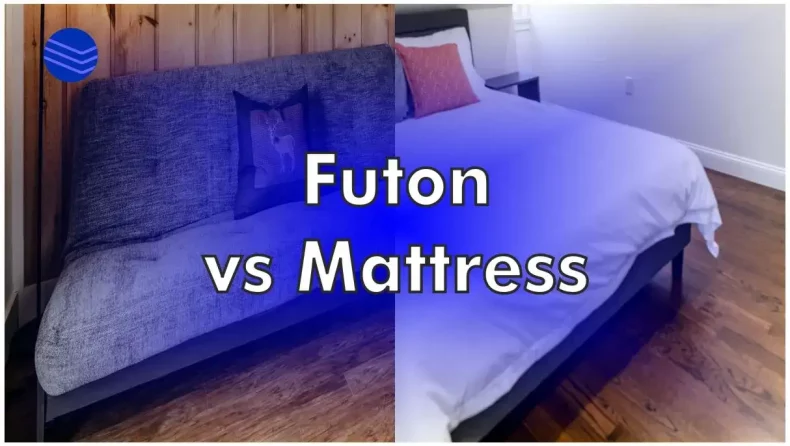
In the quest for a good night’s sleep, the choice between a futon vs mattress is a decision that shouldn’t be taken lightly.
Each has advantages and drawbacks, and making the right choice can significantly impact your comfort and overall well-being.
In this detailed guide, we will delve into the world of futons and mattresses, helping you decide the best choice for your sleep needs.
What is the Difference Between a Futon and a Mattress?
Futon and mattress are two distinct options for sleeping surfaces, each with its characteristics and advantages. Here’s a breakdown of the key differences between the two:
What is a Futon?
A futon is a versatile piece of furniture that originated in Japan. It typically consists of a mattress-like pad and a foldable frame, allowing it to serve as a sofa and a bed.
Futons are known for their space-saving design and flexibility. They come in various sizes and materials, making them suitable for various living spaces and preferences.
What is a Mattress?
A mattress is a dedicated sleep surface designed for ultimate comfort and support. Mattresses come in various types, including innerspring, memory foam, latex, and hybrid, each offering distinct benefits.
Unlike futons, mattresses are not meant to serve dual purposes and are solely designed to enhance sleep quality.
How to Choose Between a Futon and Mattress?
Now that we have a basic understanding of futons and mattresses let’s delve into the factors to consider when deciding between the two.
Comfort and Support
Futons are generally thinner than mattresses, affecting comfort, especially for those with specific sleep preferences or back issues. While some futons offer good support, they may not match the plushness of a mattress.
Mattresses are designed to provide superior comfort and support for a restful night’s sleep. They come in various firmness levels to cater to different comfort preferences.
Durability
Futons are often less durable than mattresses due to their dual-purpose design. Frequent folding and unfolding can lead to wear and tear over time. Mattresses are built to withstand years of regular use, making them a more durable investment.
Sleep Quality
Futons can be comfortable for occasional use but may not provide the support and comfort required for a quality night’s sleep.
A high-quality mattress is designed to enhance sleep quality by providing proper spinal alignment and pressure relief.
Space Requirements
Futons are ideal for small living spaces, as they can double as seating during the day and a bed at night. Mattresses require a dedicated sleeping area and may not be suitable for compact living spaces.
Health Benefits
Futons made from natural materials can be hypoallergenic and better for individuals with allergies. Mattresses with advanced technologies, such as memory foam, can offer superior pressure relief and reduce the risk of pain-related sleep disturbances.
Environmental Impact
Futons, especially those made from sustainable materials, have a lower environmental footprint than mattresses.
Eco-friendly mattress options are available, but traditional mattresses may contain chemicals and materials with a higher environmental impact.
Customization
Futon covers can be easily changed to match your decor, providing a level of customization. Mattresses are less customizable, but you can choose from different types and firmness levels.
Maintenance
Futon maintenance typically involves rotating and occasionally flipping the mattress and cleaning the cover. Mattresses require minimal maintenance, such as regular cleaning and rotation.
Price
Futons are generally more budget-friendly than mattresses, making them a practical choice for those on a tight budget. Mattresses come in a wide price range, from affordable to high-end luxury choices.
Conclusion
Choosing between a futon and a mattress depends on your needs and preferences. A futon may be suitable if you need a space-saving option that serves dual purposes.
However, a dedicated mattress is likely the better choice if you prioritize sleep quality and comfort. Consider the abovementioned factors and weigh them against your requirements to decide your sleeping arrangement.
Making the right decision can significantly impact your overall well-being, so carefully assess your preferences and needs. Remember that a good night’s sleep is invaluable, and choosing a suitable sleep surface is crucial.
